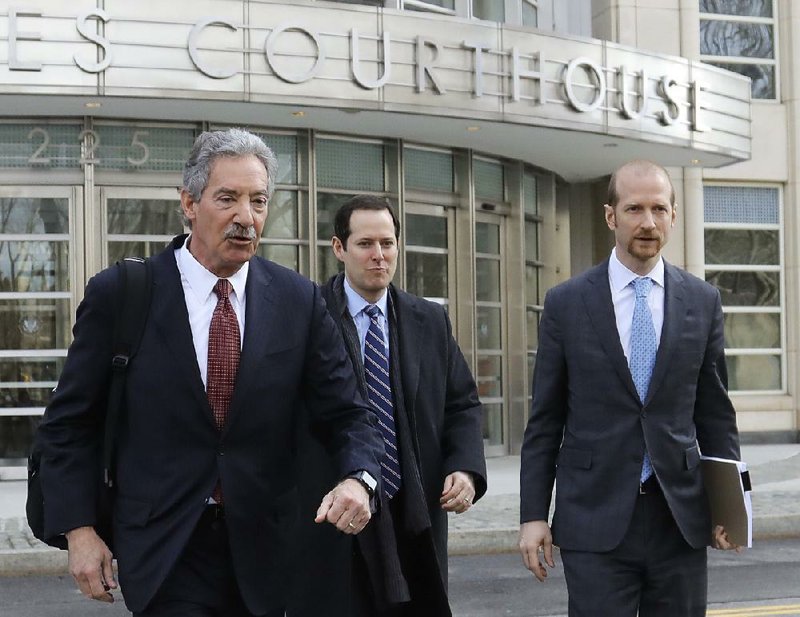Huawei Technologies Co. pleaded innocent Thursday in New York to federal charges that the company defrauded at least four banks by concealing business dealings in Iran in violation of U.S. sanctions.
The plea by China's largest smartphone maker and a U.S. subsidiary, Huawei Device USA Inc., marks the formal start of the company's defense in the U.S. case. Huawei attorney James Cole, part of a legal team that includes two former prosecutors, declined to comment further after the hearing in federal court in Brooklyn.
It came two weeks after Huawei pleaded innocent to separate federal charges filed in Seattle accusing the company of stealing technology from T-Mobile.
Both cases have heightened tensions over U.S accusations that China is using predatory tactics to turn Chinese companies into leaders in tech fields such as communications, robotics and electric vehicles.
Meng Wanzhou, Huawei's chief financial officer, who is also charged in the bank fraud case, wasn't in court Thursday. She remains free on bail in Vancouver while she fights extradition to the U.S., arguing the charges are politically motivated. Meng, who is the daughter of the company's billionaire founder, was arrested by Canadian authorities in December at the request of U.S. prosecutors.
In a 13-count indictment unsealed Jan. 28, prosecutors allege Huawei employees, including Meng, lied since 2007 about the company's relationship with Skycom Tech Co., which operated in Iran. Huawei and Meng falsely claimed Skycom wasn't an affiliate, according to the government, which filed charges including conspiracy, wire fraud and bank fraud.
Huawei is accused of using Skycom to violate a decades-old ban on doing business with Iran, including repeatedly lying to the U.S. and even to Congress regarding whether its business in Iran violated any American sanctions.
Skycom is also a defendant in the case, but no arraignment date has been set. It was not represented at Thursday's Huawei arraignment, prompting U.S. Magistrate Judge Ramon Reyes to ask prosecutors, "What's the deal with Skycom?"
Prosecutor David Kessler said the government has tried to serve the company with a copy of the indictment, adding, "given the publicity of this case, they may already be aware. We're working on it.'
U.S. prosecutors allege Meng defrauded banks when she personally made a presentation in August 2013 to an executive of one of Huawei's major banking partners in which she repeatedly lied about Huawei's relationship with Skycom.
Earlier this month, Meng sued Canadian authorities alleging wrongful detention. At a bail hearing in Vancouver, one of her lawyers, David Martin, disputed the U.S. interpretation of the 2013 meeting, noting that sanctions laws are complex and had changed over time. Evidence presented by Canadian lawyers on behalf of American prosecutors didn't make a case that Meng broke U.S. or Canadian law, Martin said.
Huawei's next court date will be April 4.
Prosecutors were alerted to the matter by HSBC Holdings Inc. when the bank flagged possible misrepresentations about Huawei's business in Iran and ended its relationship with the company in 2017. More than $100 million was cleared through correspondent banks in New York City and in Europe, according to the U.S.
Upon becoming aware of the U.S. investigation, Huawei and its American unit then tried to obstruct the investigation by trying to move witnesses who knew about its Iran-based business back to China, beyond the jurisdiction of the U.S., according to prosecutors.
The sanctions were imposed after the Iranian revolution that toppled the Shah in 1979 and led to the seizing of American hostages in the U.S. embassy.
After news articles in 2013 alleged Huawei used Skycom to do business in Iran and had tried to import American-made computer equipment, the U.S. says Meng lied to HSBC about the true relationship between the company and Skycom. Speaking through an English interpreter, Meng presented PowerPoint slides in August of that year and falsely said Huawei operated in compliance with U.S. sanctions and said she was no longer on Skycom's board.
At the time, HSBC was under investigation for violating U.S. sanctions involving Iran and later got a deferred prosecution agreement with the Justice Department and federal prosecutors in Brooklyn.
Huawei said it wasn't aware of any wrongdoing by the CFO and that authorities in both countries will "ultimately reach a just conclusion." Meng's father, Ren Zhengfei, founded Huawei and is a confidante of President Xi Jinping.
The case is an unprecedented bid by American authorities to hold a senior Chinese executive accountable for sanctions violations, though it also threatens to undermine talks designed to end a trade war between the U.S. and China. Meng could face up to 30 years in prison if convicted in the U.S.
In the Seattle case, prosecutors accuse Huawei of engaging in a scheme to steal the technology behind a robotic device that Bellevue, Wash.-based T-Mobile used to test smartphones, according to the charges.
Prosecutors say one Huawei worker even removed the robot's arm from T-Mobile's lab, took detailed measurements and photos of it, and then sent the information about it to China. The company says the worker acted independently and was later fired.
Information for this article was contributed by Patricia Hurtado of Bloomberg News and by Tom Hays of The Associated Press.
Business on 03/15/2019
